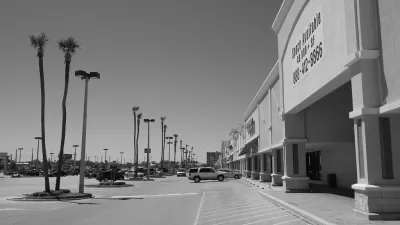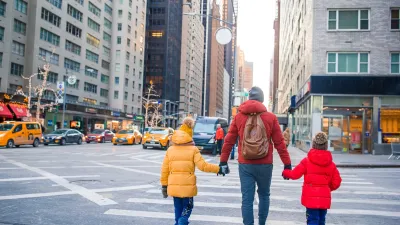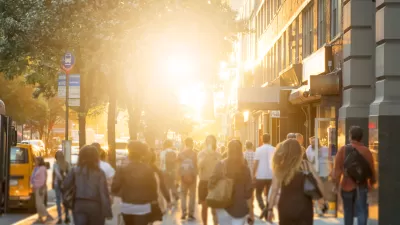David Moser pens a compelling essay that examines the ways in which sprawling auto-dependent land use patterns exacerbate poverty. As more low-income individuals and families are pushed to the suburbs, "this problem is gaining urgency."

"There are many reasons suburbs make the experience of poverty worse, but first among them is that automobiles are really expensive," argues Moser. "Purchasing, maintaining, repairing, insuring, and fueling a car can easily consume 50% or more of a limited income. For someone struggling to work themselves out of poverty, these expenses can wreck havoc on even the most diligent efforts to maintain a monthly budget."
"The lower one’s income, the greater is the proportional advantage of living in a walkable, 'car-optional' neighborhood. Those with limited financial resources can benefit from walkability the most. But due to the scarcity and cost of urban housing, low-income people are being driven away from walkable urbanism and into auto-dependent sub-urbanism."
Moser uses Seattle as a case study to demonstrate that the types of environments most able to support auto-free lifestyles also have the highest rents, whereas those neighborhoods with more affordable prices also have the lowest walkability scores.
The solution? Moser says "[t]he only way to slow this process is to build enough housing to meet the demand, preferably near transit." Efforts to limit development and preserve existing "neighborhood character" must be defeated, he asserts.
FULL STORY: Driven into Poverty: Walkable urbanism and the suburbanization of poverty

Alabama: Trump Terminates Settlements for Black Communities Harmed By Raw Sewage
Trump deemed the landmark civil rights agreement “illegal DEI and environmental justice policy.”

Study: Maui’s Plan to Convert Vacation Rentals to Long-Term Housing Could Cause Nearly $1 Billion Economic Loss
The plan would reduce visitor accommodation by 25% resulting in 1,900 jobs lost.

Planetizen Federal Action Tracker
A weekly monitor of how Trump’s orders and actions are impacting planners and planning in America.

Waymo Gets Permission to Map SF’s Market Street
If allowed to operate on the traffic-restricted street, Waymo’s autonomous taxis would have a leg up over ride-hailing competitors — and counter the city’s efforts to grow bike and pedestrian on the thoroughfare.

Parklet Symposium Highlights the Success of Shared Spaces
Parklets got a boost during the Covid-19 pandemic, when the concept was translated to outdoor dining programs that offered restaurants a lifeline during the shutdown.

Federal Homelessness Agency Places Entire Staff on Leave
The U.S. Interagency Council on Homelessness is the only federal agency dedicated to preventing and ending homelessness.
Urban Design for Planners 1: Software Tools
This six-course series explores essential urban design concepts using open source software and equips planners with the tools they need to participate fully in the urban design process.
Planning for Universal Design
Learn the tools for implementing Universal Design in planning regulations.
Caltrans
Smith Gee Studio
Institute for Housing and Urban Development Studies (IHS)
City of Grandview
Harvard GSD Executive Education
Toledo-Lucas County Plan Commissions
Salt Lake City
NYU Wagner Graduate School of Public Service





























